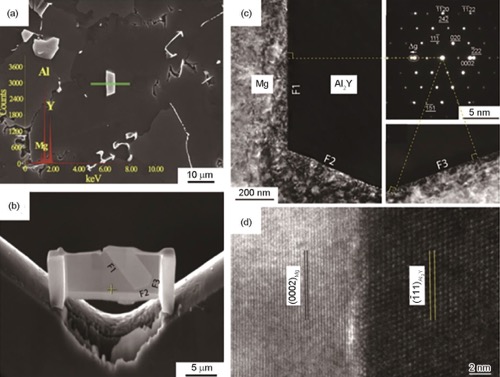Grain Refinement of As-Cast Mg-RE Alloys: Research Progress and Future Prospect
December 28,2022

Magnesium rare-earth (Mg-RE) alloy castings with a large size and complex structure exhibit versatile prospects in critical aircraft, aerospace, and defense fields owing to their ultralow density, excellent specific strength, and high-temperature resistance. The grain refinement of cast Mg-RE alloys can significantly improve their strength, plasticity, toughness, and casting performance, which are critical for expanding their applications. In this work, the grain refinement mechanism of Mg alloys by introducing RE elements and heterogeneous particles is first discussed based on the classical theory of constitutional supercooling and heterogeneous nucleation. Various grain refinement technologies for Mg-RE alloy casting using chemical and physical methods are comprehensively summarized. Further, the influence of grain refinement on the casting performance, mechanical properties, and corrosion properties of Mg-RE cast alloys is thoroughly discussed. Finally, the deficiencies and development trends of the current grain refinement of Mg-RE alloys are discussed from the point of actual application requirements.
The leapfrog development in the fields of aerospace, national defense and military industry has put forward more and more stringent requirements for the lightweight of equipment. Magnesium alloy is currently the lightest metal structural material in practical engineering applications. It has the characteristics of low density, high specific strength and specific stiffness, and good damping and vibration reduction [1]. Compared with traditional AZ and AM series magnesium alloys, magnesium rare earth (Mg-RE) alloys have higher absolute strength and better heat resistance, and have been successfully applied to key components such as launch vehicle cabins and engine casings. The effective weight reduction and maneuverability of the aircraft have been significantly improved.
However, the crystal structure of Mg is hcp structure, with less effective slip system, and its plasticity is worse than that of aluminum alloy, titanium alloy and other materials. The elongation of the high-strength cast Mg-Gd series alloys developed so far with a tensile strength greater than 350 MPa is mostly no more than 5% [4~6]; while the elongation of Mg-Gd series alloys with a tensile strength greater than 400 MPa is often Less than 3% [7~9]. It can be seen that the low ductility and toughness of high-strength cast Mg-RE alloys has become a short board that limits the development and application of this series of alloys. At present, large and complex Mg-RE alloy components in aerospace are mainly formed by sand casting process. The slow cooling rate of sand casting leads to coarse grains of the alloy, which further deteriorates the plasticity and toughness of Mg-RE alloys[10,11]. In addition, the strength of Mg-RE alloy is mainly due to its high RE content, and increasing the content of RE element will increase the hot cracking tendency of the alloy during solidification, seriously reduce its casting process performance, and limit the Mg-RE alloy in the casting process. Popularization and application on key structural parts.
Grain refinement is one of the main ways to improve and solve the above problems. Grain refinement can not only improve the strength and ductility of Mg-RE alloys, but also reduce the hot cracking tendency of the alloy by adjusting the dendrite morphology and the distribution of intergranular residual liquid phase during the solidification process. It is of great significance to expand the further application of this series of alloys in the fields of aerospace, national defense and military industry.
Based on the classic grain refinement theory, this paper summarizes the different grain refinement methods and their action mechanisms applicable to cast Mg-RE alloys, and systematically discusses the effect of grain refinement on the casting process performance and mechanical properties of cast Mg-RE alloys. and the effect on corrosion resistance. Finally, facing the practical application requirements of Mg-RE alloys, the development trend of this field is prospected.